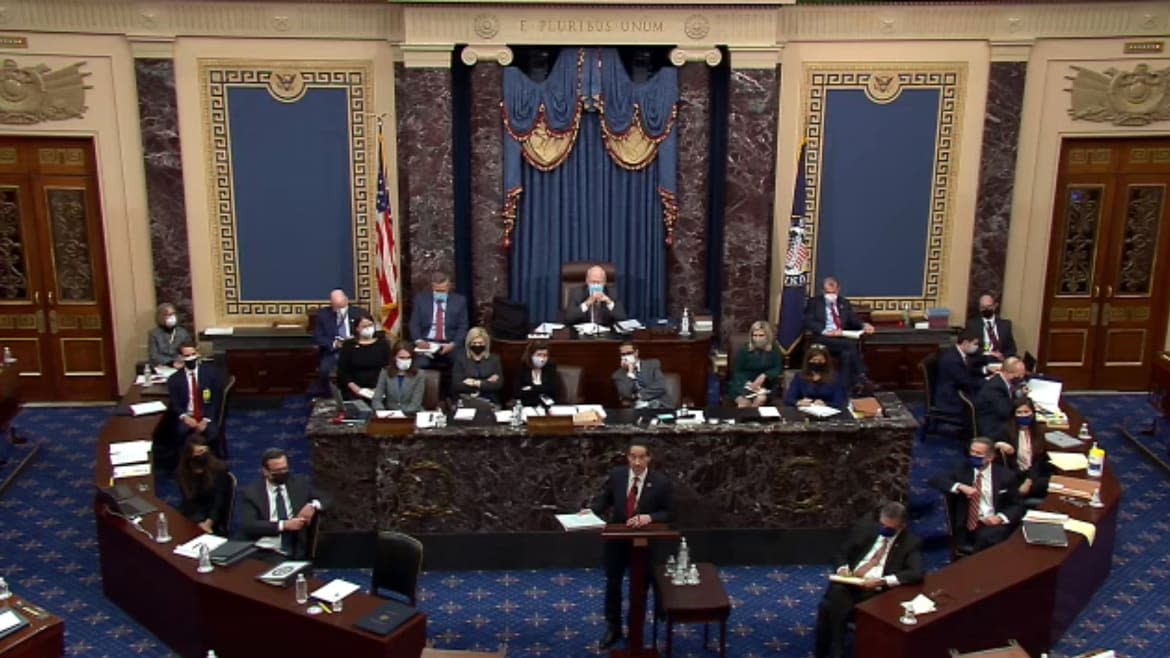First Day of Impeachment Stuns, Baffles and Shocks—but GOP Is Unmoved

The first day of Donald Trump’s latest impeachment trial ended with something close to hard proof that a conviction is not at hand: on Tuesday afternoon, only six Republican senators joined with all Democrats to affirm that the trial of a former president is constitutional.
The vote on this parliamentary point ensures the trial can move forward in earnest over the coming days. But it makes abundantly clear what was already known: that there are nowhere close to 17 GOP senators who are open to handing Trump a lifetime ban on holding federal office after his role in inciting the Jan. 6 attack on the U.S. Capitol.
The six who merely went on record that the proceeding was constitutional include all of Trump’s most reliable critics in the Senate GOP: Sens. Susan Collins (R-ME), Lisa Murkowski (R-AK), Ben Sasse (R-NE), Pat Toomey (R-PA), and Mitt Romney (R-UT), who was the only Republican to vote for Trump’s conviction in his first trial. Joining them was Sen. Bill Cassidy (R-LA), who previously voted for a resolution endorsing the unconstitutionality of the trial.
What preceded the vote was a rollercoaster of an afternoon, in the eyes of the Senate’s 100 jurors. It alternated between moments of emotional poignance and tension, and stretches of unfocused tedium and general befuddlement—offering a revealing preview of how each side will attack the impeachment trial.
The House Democratic impeachment managers prosecuting the case used their time on Tuesday—which was entirely reserved for the question of the trial’s constitutionality—to reinforce their broader case that Trump committed a historic betrayal of the country on Jan. 6. They showed senators a lengthy, custom-made video with painful footage of the Capitol attack and Trump’s statements that he “loved” the rioters.
The lead impeachment manager, Rep. Jamie Raskin (D-MD), closed by recounting how he went to the Capitol with his family to participate in floor debate on Jan. 6, the day after he buried his 25-year-old son. Raskin was on the House floor as rioters tried to break through, and he worried about his family in the gallery getting to safety.
Afterward, Raskin tearfully recounted, his daughter said, “‘Dad, I don't want to come back to the Capitol.’ Of all of the terrible, brutal things I saw and I heard on that day, and since then, that one hit me the hardest.”
Nearly all senators seemed struck by that speech. But they also seemed universally struck by what came next—albeit in a very different way. Moments after Raskin ended, Trump attorney Bruce Castor took to the lectern and began a rambling, 48-minute defense with an admission that he was buying time for his partner, Bruce Schoen, to rework their defense after the Democrats’ “well-done” presentation.
The Philadelphia attorney filibustered by calling out Trump-critical senators like Sasse—which brought about the instantly-iconic line that Nebraska is “quite the judicial thinking place”—remarking that he continued to get lost in the U.S. Capitol, and complimenting senators as “special people” and a “diverse group.”
Schoen, an Atlanta attorney, followed up to deliver the bulk of the case in a rapid-fire presentation that included bursts of yelling and recitations of poetry.
Their combined performance—especially Castor’s—was panned by basically every senator, from Trump defenders who moved to dismiss the case to the Republicans open to his conviction. Murkowski later told reporters she was “really stunned” at Castor’s performance and “couldn’t figure out where he was going.” Collins, rarely prone to hyperbole, said Castor “did not seem to make any arguments at all, which was an unusual approach to take.”
“President Trump’s team was disorganized, they did everything they could but to talk about the question at hand,” said Cassidy afterward. “And when they talked about it, they kind of glided over it, almost as if they were embarrassed of their arguments.”
Meanwhile, Sen. John Cornyn (R-TX) was not impressed by Castor or by Schoen. “The first lawyer just rambled on and on and on and didn't really address the constitutional argument,” said Cornyn. “Finally the second lawyer got around to it and I thought did an effective job, but I've seen a lot of lawyers and a lot of arguments, and that was not one of the finest I've seen.”
That the widely accepted ineptitude of Trump’s team failed to budge much of the GOP may be the most striking sign yet of how clear the direction of this trial is as it begins in full on Wednesday.
“I mean, nobody’s mind was changed one way or the other,” Sen. Lindsey Graham (R-SC), who has been advising Trump on impeachment, told reporters. “I don't know, maybe Cassidy’s mind was.”
Castor’s performance disturbed and enraged Trump enough on Tuesday that, while monitoring the trial on TV from afar at his Mar-a-Lago club in Florida, he start griping about why he hired the lawyer in the first place, two people familiar with the matter said. One of the sources told The Daily Beast Trump said he was considering pulling Castor from his defense, leaving the rest of the televised pro-Trump arguments in the hands of the rest of the new legal team, particularly Schoen.
Various elected Republicans, as well as veterans of Trump’s past teams of lawyers, were also confused as to why Castor bungled it as hard as he did, with some accusing the Trump attorney of practically winging it.
Leaving the Senate on Tuesday evening, Raskin pointed to Cassidy’s switch as a sign there is hope, at least some, that the trial is not a foregone conclusion and that “people’s minds are open.”
Asked by NBC News if there is any chance the Senate convicts, Raskin responded: “I have faith that 100 senators are going to do their jobs as jurors sworn to render impartial justice.”
Get our top stories in your inbox every day. Sign up now!
Daily Beast Membership: Beast Inside goes deeper on the stories that matter to you. Learn more.

